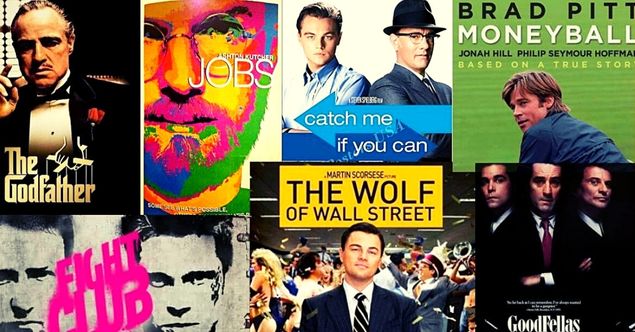How did Steve Jobs become one of the most successful people in history? What, exactly, are the Panama Papers? Did Jordan Belfort really do that?
The 2010s were full of provocative and informative business movies, including both fictional and true stories. Some of these movies portrayed the messy private lives of billionaires, while others aimed to expose corruption that still exists today. Beyond casual enjoyment, these popular and critically acclaimed works can offer relevant insight for business owners and entrepreneurs.
Here are eight of the best business movies from the 2010s that offer lessons you can apply to your own entrepreneurial pursuits.
1. The Big Short
This 2015 film starring Brad Pitt, Steve Carell, Christian Bale and Ryan Gosling presents three stories of investors who bet against the U.S. mortgage market in 2006. Ultimately, their experience reveals just how flawed and corrupt that marketplace was. The Big Short provides an insider’s look at how the dealings of investment firms, banks and hedge funds affect the general public, as in the case of the 2008 housing market crash.
Key takeaway: The Big Short emphasizes the importance of sticking to your convictions when you know you have a good idea. The character Michael Burry (played by Bale) upholds his longtime bet on the market despite pressure from clients to reverse and sell, which ultimately lands him a profit of $2.69 billion. The movie also stresses the role of morals in business, as it depicts the characters attempting to expose the banks and the government for their corruption, which eventually harms the public on a massive scale. It serves as a potent reminder to business owners that although profit is important, people are, too. [Read related article: Does Your Business Need a Code of Ethics or Conduct?]
2. The Intern
Easily described as “heartwarming,” this 2015 film follows a 70-year-old retiree (Robert De Niro) who decides to re-enter the workforce by becoming a senior intern at an online fashion site run by a young woman (Anne Hathaway). The Intern features all of the age-clash humor you might expect, like De Niro’s character insisting on wearing tailored suits at all times in the workplace. However, it also shows how the two grow closer as they learn more about each other both in and out of the office.
Key takeaway: The most obvious takeaway from The Intern is to not discredit an applicant or team member based on their age. De Niro’s character, Ben, brings his lifetime of experience to the upstart company, which benefits everyone, from the in-house masseuse to the boss herself. Less obvious is the film’s presentation of work-life balance. Hathaway’s character, Jules, started the company in her kitchen, and now that it’s grown to a much larger scale, she doesn’t have time to spend with her child or spouse. The movie reminds business owners to maintain work-life balance in their lives and to make that possible for their team members, too.
3. The Internship
The 2013 movie The Internship follows two recently canned salesmen (played by Vince Vaughn and Owen Wilson) as they take a chance and apply to be interns at Google … despite having no technology experience. Once accepted, they’re put on a team with a handful of young geniuses and, together, must compete against other teams for jobs at the company. This movie is more comedy than drama, but it does contain words-collide hijinks like those in The Intern. And just like with that film, there are vital lessons to be learned amid all the laughs.
Key takeaway: There has never been a commercial this long for transferable skills. Wilson’s and Vaughn’s characters come from heavy sales backgrounds and know nothing about tech. The whole movie is about them using their people skills to befriend ostracized developers at the company and connect with possible clients to demonstrate how they could be useful at Google. The movie serves as a great reminder to business owners and their teams to stay creative and incorporate unexpected techniques into their work. The Internship also shows the value of stepping outside your comfort zone, which we see almost every character do in the film: A phone-obsessed teen learns to appreciate the real world, a tightly wound prodigy learns to let loose, and a salesman spends hours studying lingo and code. It pays off in the end.
Google can provide more than on-screen entertainment. The tech giant offers a keyword planner that makes it easy to understand, implement and track market research. See more of the best tools for market research.
4. Jobs
Presenting the life of Steve Jobs (played by Ashton Kutcher), this 2013 movie traces the entrepreneur’s path to success, from dropping out of college to quite literally changing the world through Apple. The film shows his journey as tumultuous, portraying Jobs as taking credit for others’ work and struggling in his personal relationships.
Key takeaway: Regardless of their field or focus, all business owners can take away from this movie an understanding of the need for unceasing persistence. Jobs is shown time and time again pushing on projects regardless of the business challenges in his way or the flaws to work out. He never abandons the computer; he pushes to improve it. The movie also suggests it’s wise to avoid stomping on others – friends, family and colleagues – in your journey to the top.
Despite being praised for “making something out of nothing” and starting Apple in his parents’ garage, Steve Jobs received significant financial support from his father. However, you can start a business even if you aren’t similarly funded.
5. The Laundromat
The 2019 film The Laundromat features a widow (played by Meryl Streep) who investigates a case of insurance fraud that leads to a pair of Panama City law partners exploiting the world’s financial system and, ultimately, results in the leaking of the Panama Papers. The Laundromat frequently breaks the third wall and chooses interesting storytelling techniques to present the narrative. Although it can get confusing, the movie has a very important message about the economy and financial schemes.
Key takeaway: Like The Big Short, The Laundromat highlights rampant corruption and greed in different fields. (The Laundromat even ends with a direct call for campaign finance reforms in the U.S.) In that way, it tells business owners what not to do while also providing some warning signs of shell companies and fake trusts to help protect you from falling victim to such organizations. As a business owner, there are many times when you could encounter fraud (for example, credit card fraud and employee accounting fraud), so it’s important to stay vigilant.
7. Wall Street: Money Never Sleeps
Although it’s perhaps the least-acclaimed film on the list, Wall Street: Money Never Sleeps (2010) is worth mentioning in large part due to its predecessor, Wall Street (1987), and its tagline: “Greed is good.” The 2010 film picks up with Gordon Gekko (Michael Douglas) being released from prison after committing insider trading and securities fraud in the first film and going to work for his future son-in-law (Shia LaBeouf). Never satisfied, Gekko formulates a plan to destroy one of his Wall Street enemies and rebuild his own financial empire, which includes stealing from his own daughter.
Key takeaway: Wall Street: Money Never Sleeps is filled with so many deals and connections, including some from the first movie, that it can sometimes be hard to keep track of them all. Overwhelmingly, those countless connections, no matter how small, always come back to play a larger role in the story or the trajectory of Gekko’s or his son-in-law’s businesses. From this movie, business owners should take away a reminder to value every member of their network and avoid making enemies whenever possible. Oh, and don’t commit crimes – that’s important, too. [Learn how to know whether a business investor is offering a good deal.]
8. The Wolf of Wall Street
The Wolf of Wall Street (2013) presents the true story of Jordan Belfort, who made a name for himself as a stockbroker before turning to crime and corruption. You can think of this as a movie about the kind of people The Big Short and The Laundromat were trying to expose. The film is filled with iconic scenes and lines, as well as stellar performances from Leonardo DiCaprio, Margot Robbie and Jonah Hill. It showcases the high life of those who use unethical means to get rich in business … and what happens afterward.
Key takeaway: Although no business owner should replicate Belfort’s illegal activities, we can appreciate his penchant for sales and pitching. As we learned from The Internship, you can apply sales skills in a variety of surprising fields and situations. After all, every business has a service or product that it must convince clients to pay for. Belfort’s dedication to the sale and his creative (legal) methods for solving problems can inspire entrepreneurs to strengthen their pitch skills. And, like several others depicted in the movies on this list, viewers can learn from all the ways Belfort went wrong.





